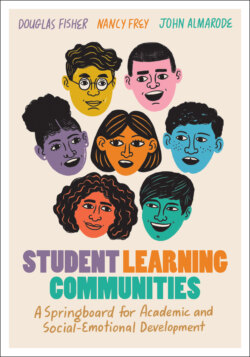Читать книгу Student Learning Communities - Нэнси Фрей - Страница 20
На сайте Литреса книга снята с продажи.
Independent Learning
ОглавлениеIt might seem strange to suggest that talk plays a critical role during independent activities. But think about the self-talk you engage in when you complete a task. Some of this self-talk (inner speaking) occurs in your mind; some is vocalized. Again, thinking occurs as we use language, making this type of talk an important aspect of learning. As students work independently, they may also use talk to acknowledge and discuss input on their work and give feedback to others. Reporting out after independent work may require a more formal register of language than that used during collaborative activities.
Well-structured independent learning tasks should build confidence. By the time students have reached this phase, they should feel prepared for the task, especially when completing it asynchronously, outside the company of the teacher. After all, the purpose is clear, and the teacher has modeled how it is done. There has been time for collaborative work with peers, and any necessary guided instruction has been provided. With the students now at the level of competent novice, the purpose is to help them refine and become more expert. (After all, isn't this how you learned to be a teacher?)
Independent learning becomes the ultimate way to build self-esteem through competence. Self-efficacious learners drive their own motivation to take on new concepts, because they know they have learned in the past and can do so again. Confident learners are more likely to complete independent tasks because they know they can complete them successfully. Too often, students have not had the modeling, guided instruction, and productive group work necessary to be successful independently. But those who have completed this instructional cycle learn from experience that independent learning is fully in their power.
